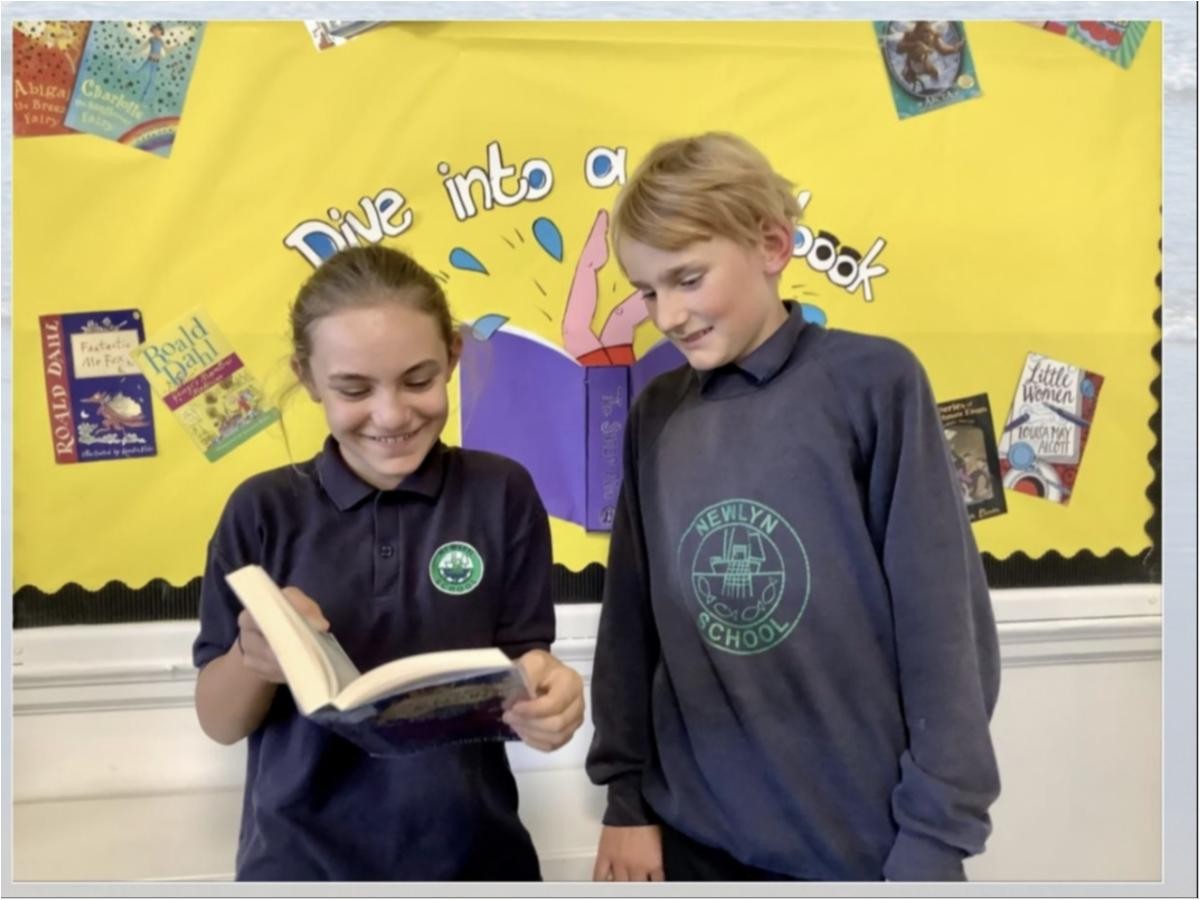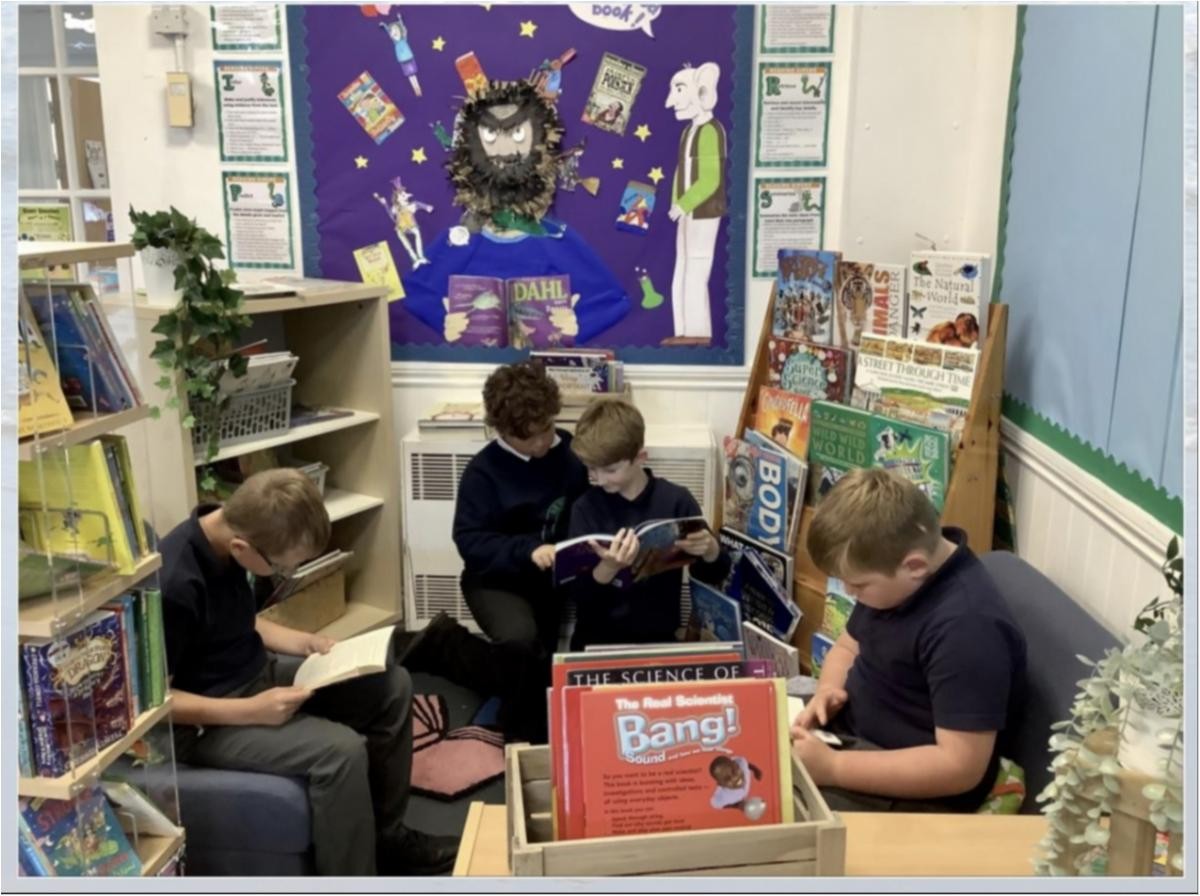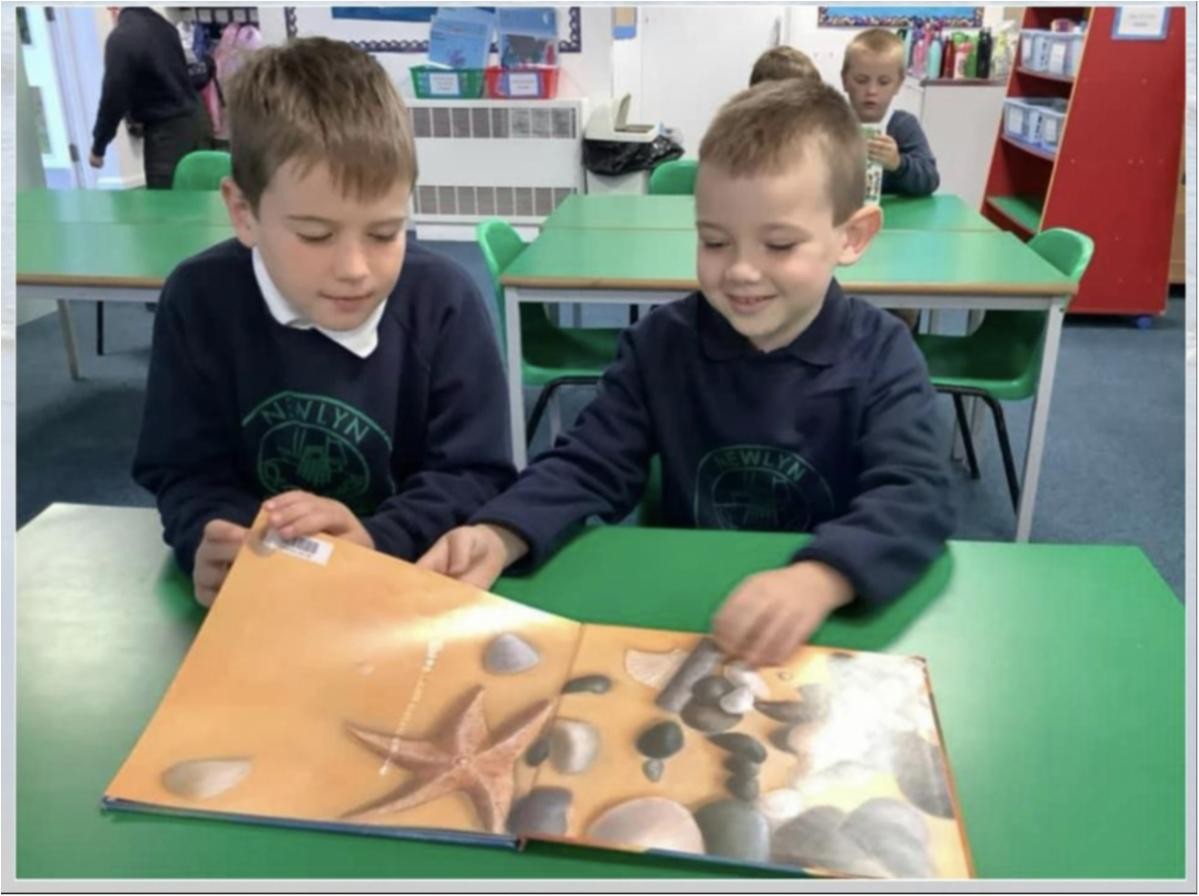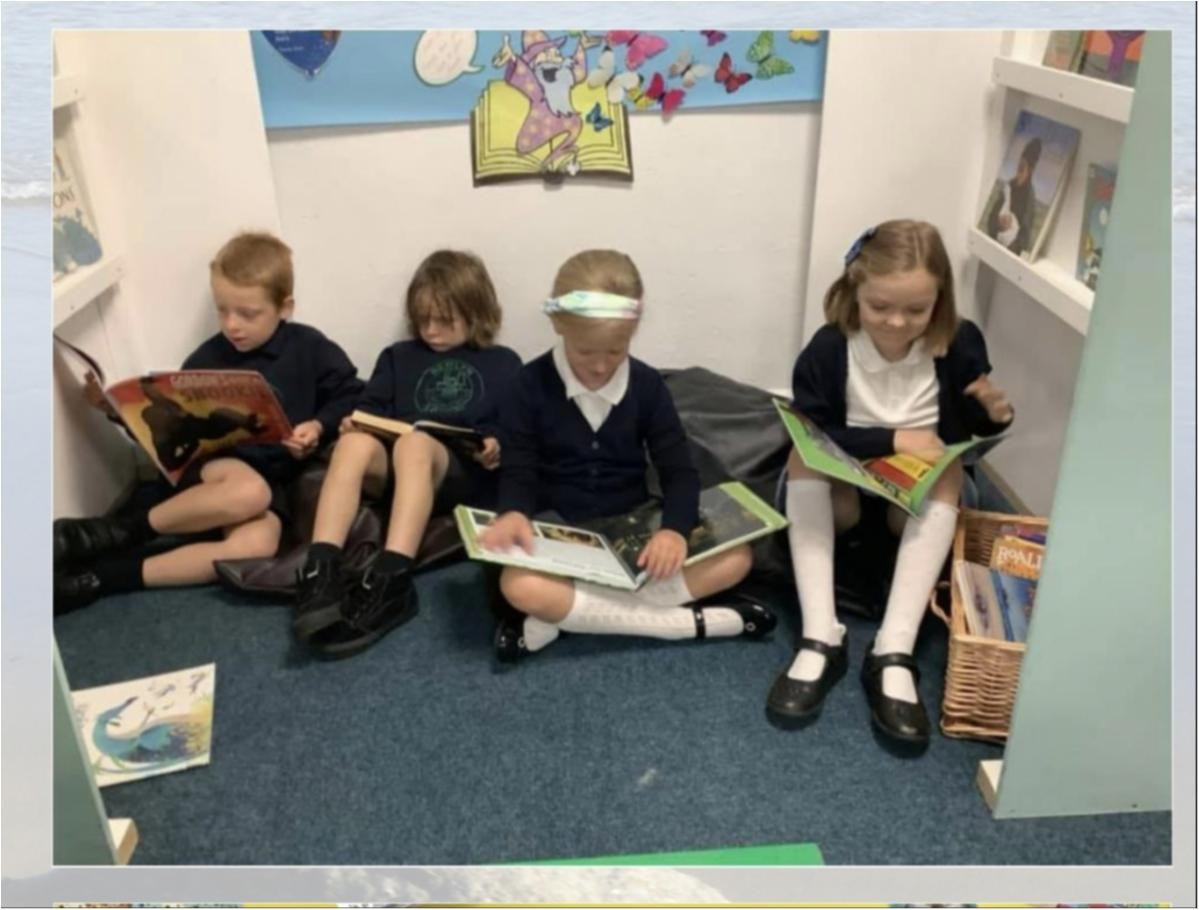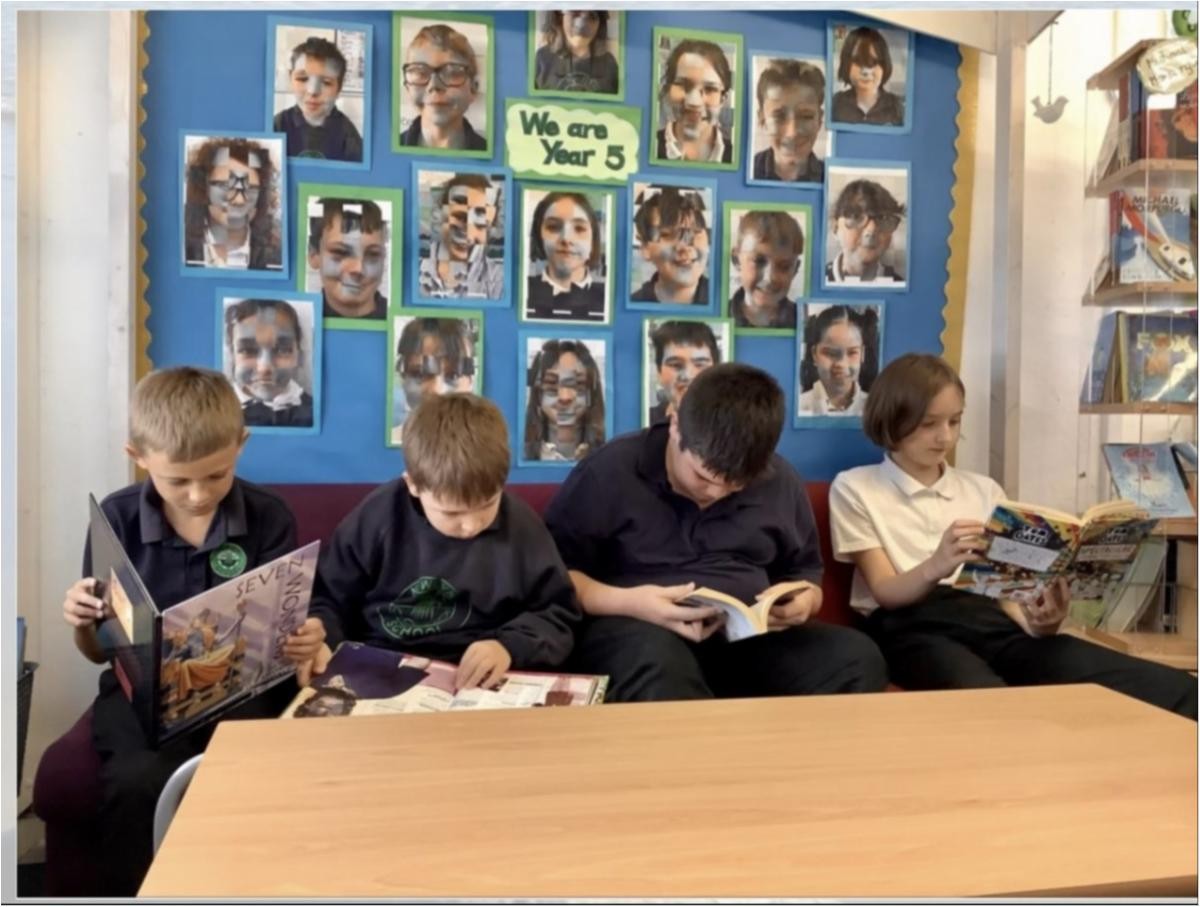7 Aspects of Reading at Newlyn School
How do we prioritise reading?
- We have invested in a new school library where the children can take books home to share with their families, or simply read for pleasure.
- We have invested in new books that match the topic, non-core subjects and pupils’ interests.
- Each of our classrooms has a reading corner where pupils can sit comfortably during the day to read a book.
- We have bought high quality story books and visual literacy books for each class.
- As reading is such a priority, we pay for the maximum support from the library which means we get a regular book delivery and support with our own library from a librarian.
- We have invested in high quality guided reading texts and whole class texts to support good quality teaching and learning.
- We have a Reading Champion who promotes the love of reading with our junior children and runs a more able Book Club to challenge our more able readers.
- To encourage reading at home we reward pupils with certificates and run an annual Pyjama Party. We use the Pyjama Party as an opportunity to talk to parents about the importance of reading to their child and offering support with how to listen to their child read. These have been very well attended.
- We monitor pupils who do not read at home so that we can provide extra provision in school where necessary.
- Whole class or guided reading sessions take place in each class every week to ensure that every pupil is in a group reading session at least once a week.
- Children who are not reading frequently at home are also heard individually to read at school.
- Reading is prioritised in EYFS and KS1 with 1:1 reading sessions, twice weekly in EYFS and at least once a week for KS1 although children not at the expected level are prioritised for extra 1:1 reading sessions.
- 1:1 reading sessions continue in KS2 for children not at the expected level and for all children who are assessed by the class teacher on a 1:1 basis each term.
- Little Wandle, an approved synthetic phonics programme, is used in EYFS and KS1. Phonics is prioritised in the school as can be seen by the investment in decodable texts and resources. Half hour phonics sessions take place every day.
- Phonics catch up intervention continues throughout the school for children who have not passed the phonics test with termly assessment to measure progress.
- Early reading is encouraged by providing pupils with non-worded reading books in the first instance. Once they have developed their phonics and decoding skills they are then moved on to texts that match their phonic ability and are fully decodable.
- Children take home books that are matched to their phonic abilities, and once this is secure, children are guided to select appropriate books to further develop their reading.
- Our ‘Free Reader’ books continue to be banded books and children’s progress through these books is monitored.
How do we promote a love of reading?
- Every member of staff is committed to the belief that that reading, and particularly reading for pleasure, is the most important skill a child can learn.
- Our staff are passionate about reading and share their own love of reading with the children.
- Teachers read class stories daily to promote a love and enjoyment of stories, immersing them in the world of imagination.
- Books are carefully matched to the topic, to give the children a breadth of different genres and help them gain a depth of understanding about their current topic.
- Our learning opportunities incorporate a range of fiction, non-fiction and poetry, to expose pupils to different texts they may enjoy.
- Whole class and guided reading sessions are used to fully engage children in a text and to give them time to explore vocabulary, characters and plots, sharing their own thoughts and opinions.
- The children use the library with adult support to ensure they choose a text that is right for them and to encourage them to expand their horizons rather than sticking to a known author or genre.
How do we make sure pupils make progress?
- Phonics is taught following the government approved Little Wandle Revised Letters and Sounds programme. Phonics lessons follow the same sequence of Revisit and Review, Teach, Practice and Apply. Planning includes assessment for the graphemes taught. Phonics is assessed half termly to identify gaps in learning to inform future planning and intervention. Phonics is taught daily.
- Children are heard read individually once a week except for those who need extra support and our EYFS children who are heard more regularly.
- All children are assessed once a term by the class teacher to identify next steps and to ensure progress is being made.
- Written assessments take place each term to measure progress from Y1-Y6.
- Whole class or guided reading taught each week, alongside 1:1 reading.
- The sessions are well-structured and provide opportunity for pupils to read independently and to develop comprehension skills using VIPERS style questions.
- The school supports pupils to be expert readers by developing the key skills of understanding vocabulary, inference, prediction, explanation, retrieval and summarise.
- Vocabulary - Find and explain the meaning of the words in context.
- Inference - Make and justify inferences using evidence from the text.
- Predict - Make predictions using details both written and implied.
- Explain - Explain how content is related and contributes to the meaning as a whole.
- Explain how meaning is enhanced through choice of language.
- Explain the themes and patterns that develop across the text.
- Explain how information contributes to the overall experience.
- Retrieval - Retrieve and record information and identify key details from fiction and non-fiction.
- Summarise - Summarise the main ideas from more than one paragraph.
- There is a clear progression of reading skills from Reception to Year 6 against which pupils’ progress is measured and gaps are noted and acted on.
- Pupils who are struggling with decoding skills (preventing them from accessing reading material) have targeted interventions or are part of a smaller reading group.
- Pupils who need further opportunity to practise reading because they do not read at home, are given priority to read to an adult in school.
- We assist parents with supporting reading by providing parents meetings, our Pyjama Party, information on the website and reinforcing our 10 Minutes a Day challenge.
How do we match the pupils' reading books to their phonic ability?
- Pupils are assessed daily in phonics as well as half termly using the Little Wandle assessments. Assessment then informs which books match the pupil’s phonic ability.
- Staff in EYFS and KS1 are responsible for changing and checking the pupil’s reading books. Pupils who are learning phonics in EYFS and KS1 take home a book that matches their phonic level. Once children reach the end of the Little Wandle reading scheme they will move to banded books.
- We will use Big Cat books that were created to match Little Wandle, (please note- these are still unavailable at this current time). We currently use updated decodable Oxford Reading Tree texts that match Letters and Sounds. The banded books are Oxford Reading Tree and are used once children become a ‘free reader’, to ensure they are choosing an appropriate text and to monitor progress. Children will also be guided to read a range of genres and authors and to move on to more challenging texts. This is supported through the use of our Reading Champion.
- We monitor progress in reading and then match their ability to the stage of reading on the scheme. We do this through termly teacher assessments, guided reading assessments using VIPERS and termly written assessments.
How do we teach phonics from the start?
Pupils begin learning letter sounds on entry to EYFS.
Reception Autumn 1
|
|
Phase 2 graphemes |
New tricky words |
|
Week 1 |
s a t p |
|
|
Week 2 |
i n m d |
|
|
Week 3 |
g o c k |
is |
|
Week 4 |
ck e u r |
I |
|
Week 5 |
h b f l |
the |
|
|
Phase 2 graphemes |
New tricky words |
|
Week 1 |
ff ll ss j |
put* pull* full* as |
|
Week 2 |
v w x y |
and has his her |
|
Week 3 |
z zz qu words with s /s/ added at the end (hats sits) ch |
go no to into |
|
Week 4 |
sh th ng nk |
she push* he of |
|
Week 5 |
|
we me be |
Reception Spring 1
|
|
Phase 3 graphemes |
New tricky words |
|
Week 1 |
ai ee igh oa |
|
|
Week 2 |
oo oo ar or |
was you they |
|
Week 3 |
ur ow oi ear |
my by all |
|
Week 4 |
air er words with double letters: dd mm tt bb rr gg pp ff |
are sure pure |
|
Week 5 |
longer words |
|
Reception Spring 2
|
|
Phase 3 graphemes |
No new tricky words |
|
Week 1 |
review Phase 3: ai ee igh oa oo ar or ur oo ow oi ear |
Review all taught so far Secure spelling |
|
Week 2 |
review Phase 3: er air words with double letters longer words |
|
|
Week 3 |
words with two or more digraphs |
|
|
Week 4 |
longer words words ending in –ing compound words |
|
|
Week 5 |
longer words words with s in the middle /z/ s words ending –s words with –es at end /z/ |
Reception Summer 1
|
|
Phase 4 |
New tricky words |
|
Week 1 |
short vowels CVCC |
said so have like |
|
Week 2 |
short vowels CVCC CCVC |
some come love do |
|
Week 3 |
short vowels CCVCC CCCVC CCCVCC longer words |
were here little says |
|
Week 4 |
longer words compound words |
there when what one |
|
Week 5 |
root words ending in: –ing, –ed /t/, –ed /id/ /ed/ –est |
out today |
Reception Summer 2
|
|
Phase 4 graphemes |
No new tricky words |
|
Week 1 |
long vowel sounds CVCC CCVC |
Review all taught so far Secure spelling |
|
Week 2 |
long vowel sounds CCVC CCCVC CCV CCVCC |
|
|
Week 3 |
Phase 4 words ending –s /s/ Phase 4 words ending –s /z/ Phase 4 words ending –es longer words |
|
|
Week 4 |
root word ending in: –ing, –ed /t/, –ed /id/ /ed/, –ed /d/ |
|
|
Week 5 |
Phase 4 words ending in: –s /s/, –s /z/, –es longer words |
- Our children take home their phonically decodable reading book to reinforce the sounds taught and the common exception words.
- Phonics is discussed with parents in the Transition to School meeting and parents are given resources to support phonics at home. This is also available on our website. When Reception pupils have started school another meeting on supporting phonics is provided for parents.
How do we support pupils to catch up?
- Summative data is submitted once a term and pupil progress analysis is taken from this. Pupils identified by class teachers and in pupil progress meetings as not making progress have interventions planned for them and teaching staff are aware of who is a priority for intervention/support.
- Formative data informs day-to-day planning and teachers adapt and change this according to the pupil needs.
- Pupils who did not achieve their phonics check receive interventions including extra reading and small group phonic support.
How do we train staff to be reading experts?
- Teaching staff, including Teaching Assistants are Little Wandle and Letters and Sounds trained.
- We have ensured that all our teachers and teaching staff have received training as we believe that phonics is key to reading and all staff , regardless of the key stage they work in , should understand how it is taught and how to support our children.
- In-house training for listening to children read and teaching synthetic phonics has also taken place with clear guidance and monitoring in place. Staff meetings and TA meetings have focussed on how to hear a child read and videos of good practice have been shared.
- Subject leads for writing and reading attend the TPAT network meetings and cascade relevant information back to the school.
- The reading lead monitors reading and offers guidance to staff with follow up actions

